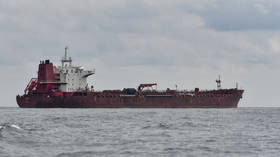Swedish Police Investigate New Baltic Sea Cable Damage

Swedish authorities said Friday that they were investigating suspected damage to an underwater cable in the Baltic Sea, following a series of incidents that some observers believe are acts of sabotage linked to Russia.
Finnish operator Cinia reported „some disturbance“ on its C-Lion 1 communications cable, which connects Finland and Germany.
„However, the disturbance does not affect the functionality of telecommunications connections running in the cable and the data traffic continues flowing normally,“ Cinia said in a statement, adding that the cause was still under investigation.
The same cable was previously cut in November, with suspicions falling on a Chinese vessel.
The latest incident adds to growing concerns over damage to cables and other critical infrastructure in the Baltic Sea amid heightened tensions between the West and Russia over Moscow’s war against Ukraine.
Swedish police spokesman Mathias Rutegard told AFP that authorities had opened an investigation into suspected „sabotage“ following reports of damage east of the Swedish island of Gotland.
„We have opened a preliminary investigation into a suspected broken cable in the Baltic Sea and within the Swedish economic zone,“ Rutegard said.
Police later said they had „no suspect“ at this stage.
Swedish coast guard spokeswoman Karin Cars confirmed that a ship had been sent to the site and was assisting with the crime scene investigation.
Swedish Prime Minister Ulf Kristersson said in a post on X that the government was closely monitoring the situation.
„We take all reports of possible damage to infrastructure in the Baltic Sea very seriously. As I have said before, they must be seen in the context of the serious security situation,“ Kristersson wrote.
The European Commission announced Friday that it would tighten security requirements for underwater cables, prioritize financing for advanced cable deployment and enhance capabilities for rapid repairs.
It also vowed to enforce sanctions against „hostile actors“ and vessels within Russia’s „shadow fleet“ — a network of ships believed to be evading Western sanctions.
A Message from The Moscow Times:
Dear readers,
We are facing unprecedented challenges. Russia’s Prosecutor General’s Office has designated The Moscow Times as an „undesirable“ organization, criminalizing our work and putting our staff at risk of prosecution. This follows our earlier unjust labeling as a „foreign agent.“
These actions are direct attempts to silence independent journalism in Russia. The authorities claim our work „discredits the decisions of the Russian leadership.“ We see things differently: we strive to provide accurate, unbiased reporting on Russia.
We, the journalists of The Moscow Times, refuse to be silenced. But to continue our work, we need your help.
Your support, no matter how small, makes a world of difference. If you can, please support us monthly starting from just $2. It’s quick to set up, and every contribution makes a significant impact.
By supporting The Moscow Times, you’re defending open, independent journalism in the face of repression. Thank you for standing with us.
Continue
Not ready to support today?
Remind me later.
×
Remind me next month
Thank you! Your reminder is set.

